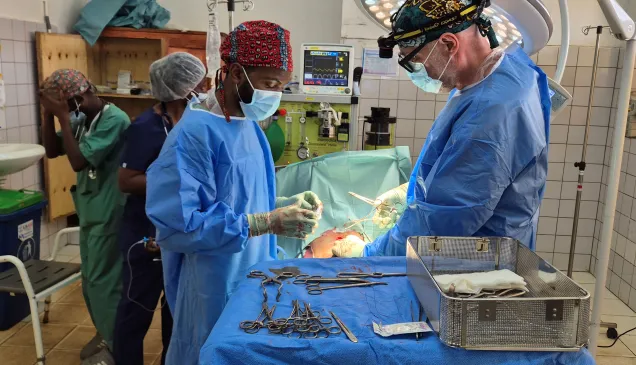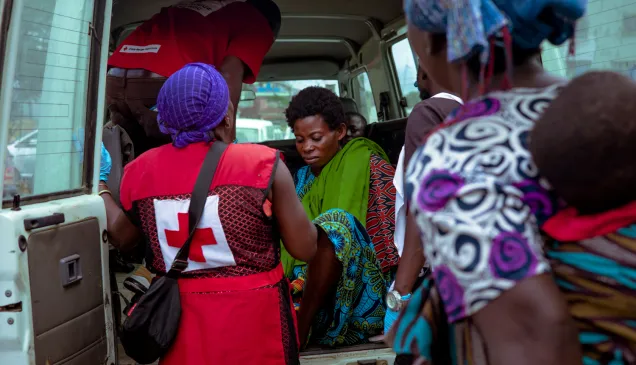Democratic Republic of the Congo: The art of stopping the moment
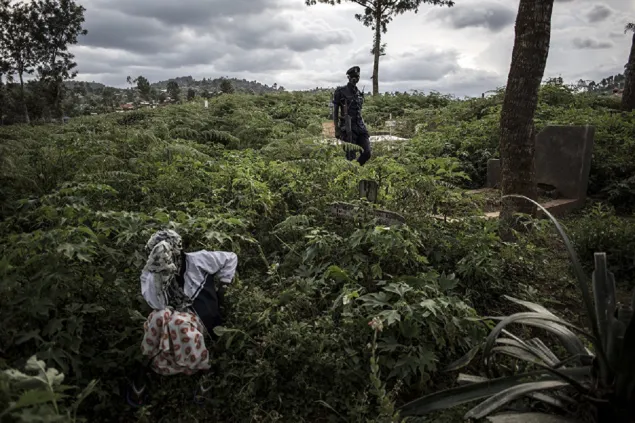
One of the most important elements of the culture of any nation is the posthumous rite. Ebola destroys all traditions, deprives people of the opportunity not only to feel the grief together, but also just to feel it. The custom requires crying over the body of the deceased, dressing it up for the funeral, and performing many other actions by touching the remains. Due to the epidemic, goodbye is said without touching. Only close relatives are allowed to approach the burial place.
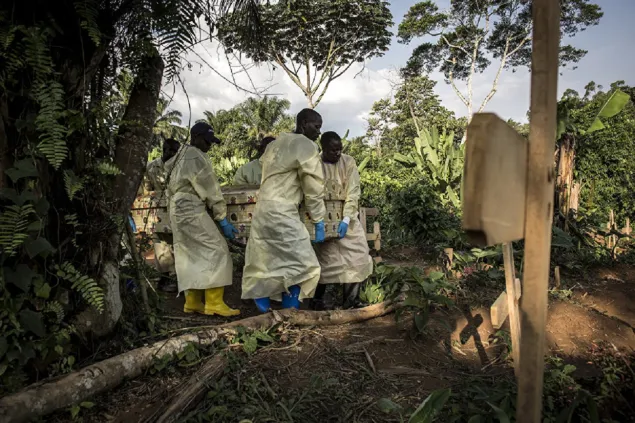
July 15, 2019, Beni. Doctors carry a coffin with the body of one of the dead from Ebola
Every virus has its own characteristics of distribution. The Ebola virus is most contagious right after a person dies. Therefore, before the funeral, the body of the deceased is sprayed with bleach, then put into a bag for a corpse, and then into a coffin, which is lowered into the grave by strangers dressed in overalls of special protection.
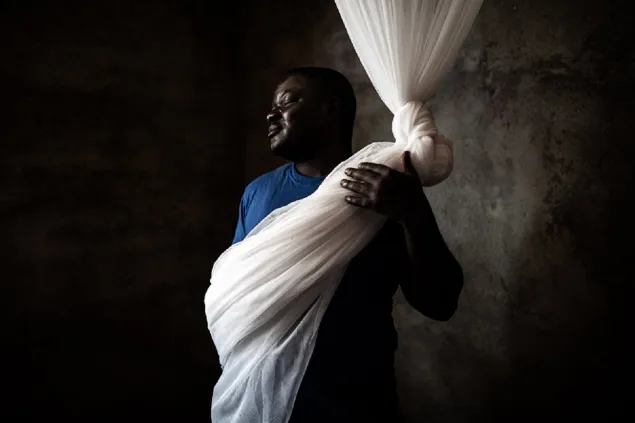
On September 17, 2019, 34-year-old Richard suffered from Ebola. His wife, who also contracted the Ebola virus, passed away in early 2019. Now he was left alone with two children in his arms
Richard at his home in Beni, northeastern DR Congo. More than 2,000 people have died in the country since a new outbreak began in August 2018. About a thousand of the infected have recovered.
Fortunately, not everyone who gets sick will die. If the patient is hospitalized at the first symptoms, he can be cured. In DRC, such people are called “winners”.
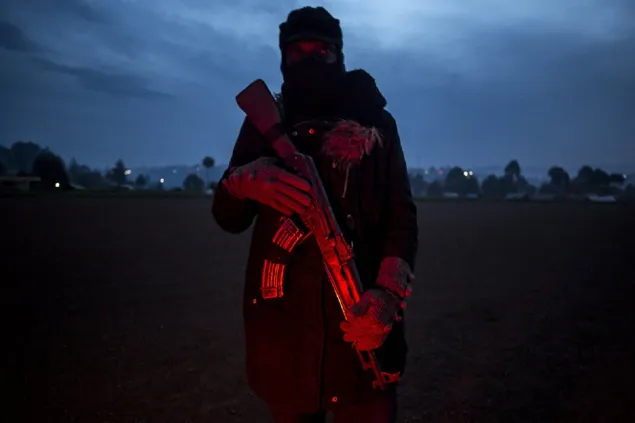
May 18, 2019 Butembo, North Kivu province. Local policeman before going on patrol. The city of Butembo in North Kivu province is at the epicenter of the Ebola epidemic and the resulting crisis. One of ups has repeatedly attacked specialized clinics that treat fever, thereby making it difficult to fight the epidemic</h2>In areas affected by Ebola, there are thousands of people fleeing their homes from the fighting. When people are weakened by stress, malnutrition, poor hygiene conditions, serious efforts must be made to prevent the spread of the epidemic.
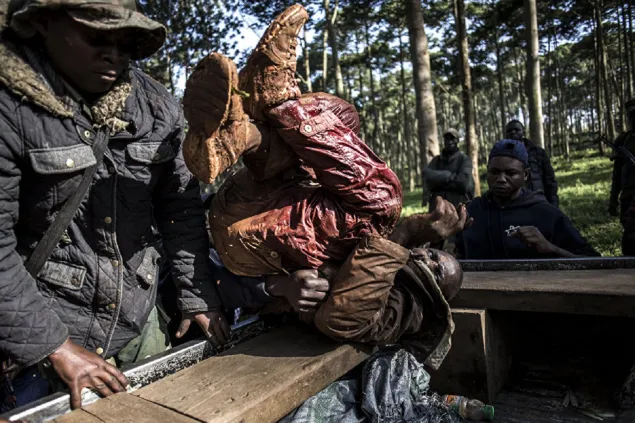
An injured armed group member is thrown into the back of a truck outside a medical center in the city of Butembo, where Ebola is being treated. The city is at the epicenter of a new outbreak in DR Congo. Armed group members attacked the treatment center on the night of March 9, 2019</h2>As a result, one police officer was killed and his colleague was injured. In the past month alone, there have been more than 30 attacks and other incidents targeting institutions involved in the fight against the epidemic. An outbreak of Ebola began in North Kivu province last August and subsequently spread to neighboring Ituri province.
According to the latest data from the Ministry of Health of the DR Congo, 894 cases of infection have been registered, including 561 deaths. Conflict situations are hard for everyone, including doctors. Over the past 2 years, more than 300 attacks on medical institutions have been committed in the DRC, as a result of which 11 doctors and patients have died.
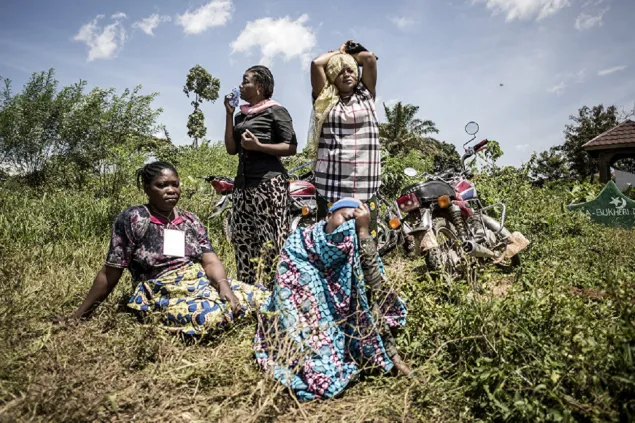
Women mourn the death of a family member during a funeral on the outskirts of Beni, North Kivu province
One of the most important factors contributing to the decrease in the incidence of fever has been the decline in the use of traditional, but highly dangerous, funeral rites, in which the infectious bodies of the dead have been touched by grief-stricken relatives. However, giving up part of your culture is sometimes just as difficult as giving up yourself. Therefore, in some places, unsafe rituals still exist.
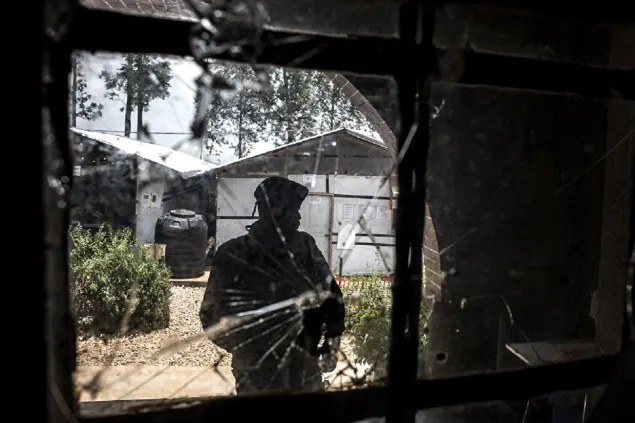
A photo of a police officer taken through a bullet hole left after an attack on a clinic where patients with Ebola are being treated.
Tackling epidemics is usually not the responsibility of the ICRC. But we have been working in the DRC for many years in connection with the armed conflict and can make sure that all brigades work in a safe environment. Red Cross staff on the ground received training and personal protection equipment. Like all medical personnel on the front line of the epidemic, they also were able to benefit from the vaccine offered by WHO.
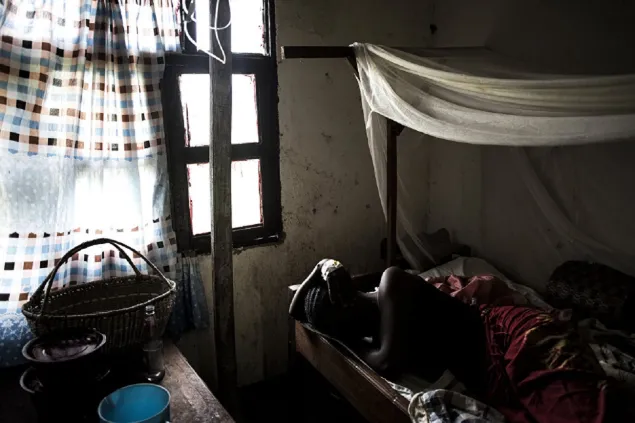
June 17, 2019, Aloya village. A girl named Desange awaits an announcement of the diagnosis and a decision on her possible transfer to a specialized clinic for patients with Ebola
Fighting Ebola also means fighting rumors and prejudice. Among local residents, for example, there are opinions that a sorcerer can cure Ebola. However, treatment for such a serious illness is possible only in a specialized hospital and the goal of humanitarian workers is to explain to people that as soon as they notice symptoms in themselves, they should immediately go to the treatment center.
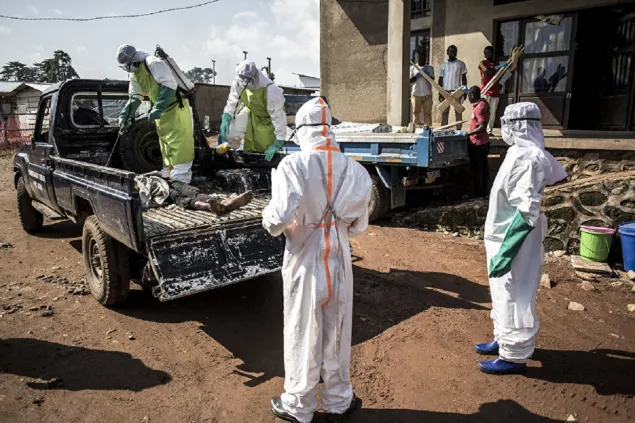
July 15, 2019 Beni. Doctors disinfect the corpse of a thief killed by the military the night before
Stopping the spread of the virus requires careful handling of the bodies of people believed to have died of fever. Specialists from the ICRC, the International Federation of Red Cross and Red Crescent Societies and the Red Cross of the Democratic Republic of Congo are helping to organize a safe burial, as well as providing general precautions.
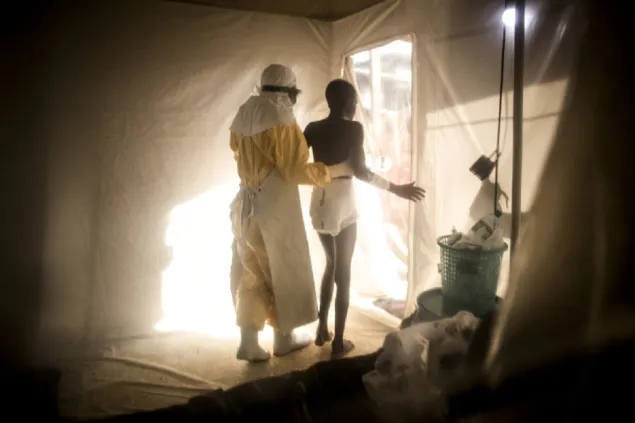
A health worker helps a patient with Ebola out of the isolation ward. Beni, North Kivu province
Ebola fever has made its own adjustments in the life of people. Everywhere were equipped with places for washing hands with chlorinated water. In addition, among the mandatory measures is spraying the soles of shoes. Everywhere people measure their temperature with a non-contact thermometer. All of these measures, already familiar to us, have proven effective in preventing the catastrophic spread of the virus.
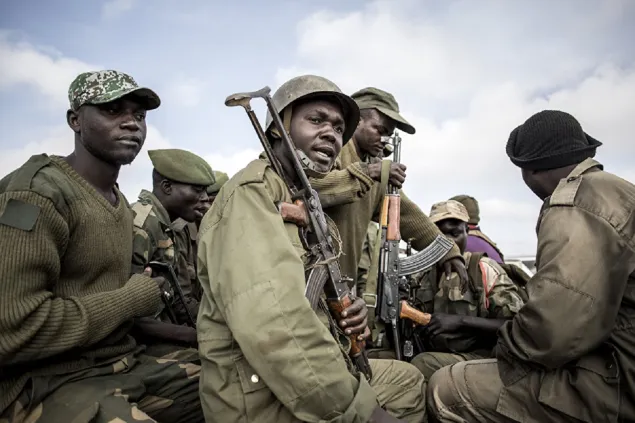
May 18, 2019 Butembo. Government soldiers prepare to accompany medical workers involved in the fight against Ebola on their journeys around the city and its surroundings
Medics in the conflict-ridden region are forced to work under the protection of the military, which only increases the confusion among residents of settlements where Ebola is rampant.
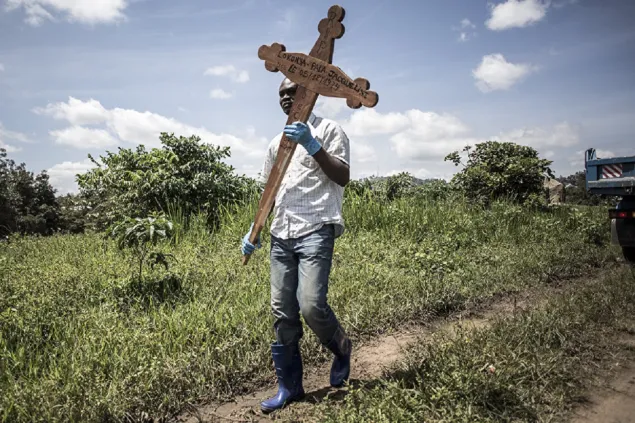
July 14, 2019 Beni. A family member of an Ebola patient carries a cross to his safe burial site.
The Ebola epidemic in Africa has affected thousands of people and has tragically affected entire communities and even countries. Experience has shown that it is impossible to cope with it with medical means only. It is necessary to change people's behavior and their entire way of life.
We would like to thank the photo reporters who turn photo chronicles of events into art and put their whole hearts into their work, giving us the opportunity to see what is happening in different parts of the world.
Photo reporters sometimes take great risks to share important news with us and convey the essence of events in photo frames.
We cannot ignore such important work, therefore, at the Andrei Stenin International Competition for Young Photographers, we present a special prize for the best humanitarian photo.
Here is a series of photographs of Ebola, dedicated to the 10th epidemy of the virus. The series received a special prize from the ICRC in 2020. Images by John Wessels, South African photographer.
The 10th Ebola epidemic in the Democratic Republic of the Congo, which has been plagued by attacks of armed groups, abductions and terror for many years, was officially announced in August 2018.
Before the 10th outbreak was declared, the area was infamous for its volatile history of over 20 years of violence and conflict between various armed groups and the military. Fighting an outbreak in an area rife with violence has its own challenges.
Displacement and insecurity make tracing cases much harder while some communities are in the "red zones" which aren't accessible to all organizations involved in the Ebola response. Attacks, demonstrations and some violent incidents with certain community members have slowed down the response and created gaps in tracing people potentially infected with Ebola, in vaccinating them and burying the victims.
In the Democratic Republic of the Congo, the ICRC promotes respect for international humanitarian law in the treatment of civilians and detainees and helps those adversely affected by conflict and internal violence to survive and become self-sufficient.
ICRC knows the region and its actors, thus can provide full-range support in reaching the people and numerous families, that had already been shattered by the loss of loved ones, fleeing and leaving everything behind, starting over and over again, while living under the constant fear of the next attack.
Solutions have been found. For example, the Red Cross trained local civil protection teams in safe and dignified burials to be able to conduct them in areas that are inaccessible due to insecurity. Volunteers were trained to conduct safe and dignified burials and awareness-raising sessions were adapted for local people.
Ebola is transmitted through fluids: tears, sweat, semen, blood. So, in order not to get infected, you cannot touch anyone. Absolutely. It is very difficult to refuse contact, to cover with a mask and gloves, as we already - alas – know from our own experience. The inhabitants of Africa felt this before others with an epidemic rise. Let's see the story in pictures that won the jury.

